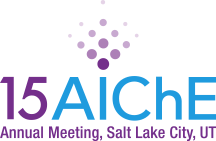

Continuous Pharmaceutical Manufacturing (CPM) has recently emerged as a promising alternative to the currently dominant batch production methods which are expensive to develop and are characterised by low operational asset efficiency. Advances in continuous organic synthesis routes have induced demonstrations of full (end-to-end) continuous pharmaceutical production and comparative economic analyses explicitly illustrate CPM advantages (Schaber et al., 2011), thus attracting the strong and sustained interest of global pharmaceutical corporations (Jiménez-González et al., 2011) and authoritative regulatory bodies (Lee et al., 2015).
The foundation of every truly novel CPM process is the continuous synthesis chemistry, which has been demonstrated for numerous Active Pharmaceutical Ingredients (APIs), from common painkillers and blockbuster anti-cancer medications, to key therapeutic molecules against debilitating tropical diseases (Bogdan et al., 2009; Hopkin et al., 2013; Kopetzki et al., 2013). Landmark experimental studies have demonstrated viable end-to-end pilot-scale processes from raw feedstocks to final product formulations (Heider et al., 2014). Nevertheless, fully continuous separations must be fully elucidated and are critical toward maximising CPM potential at production scale (Baxendale et al., 2015). The importance of systematic process systems engineering methodologies is evident toward evaluating and demonstrating CPM benefits, both in primary/upstream (Jolliffe and Gerogiorgis, 2015) as well as in secondary/downstream (Sen et al., 2013) pharmaceutical processing.
The present paper addresses the problem of technical and economic optimisation of a conceptual upstream flowsheet for API production, with explicit consideration of reaction and separation unit operations. A nonlinear optimisation model is formulated to maximise the Net Present Value (NPV), subject to explicit mass and molar balance constraints for a reaction cascade comprising three plug flow reactors (PFRs), with explicit inclusion of revenue, fixed capital (CapEx) and operating expenditures (OpEx), plant operation lifetime and inflation rate. Chemical reaction kinetics have been determined from experimental data analysis of a previously published continuous organic synthesis pathway (Bogdan et al., 2009). Furthermore, feedstock price variation and heat transfer requirements are explicitly included in the model, to achieve a realistic estimation of operating costs.
As API recovery from the final separation affects revenue significantly, continuous final separation schemes and the impact of solvent selection on product recovery are explicitly addressed. The range of available options for continuous separation is systematically analysed via the inclusion of UNIFAC equations which correlate API solubility and product recovery: several possible green solvents (to ensure low toxicity and minimal environmental impact) and process operating conditions (temperature, solvent feed ratio) have been considered. Constraints include product purity and design sustainability (via waste limitation). Optimisation results indicate that the CPM plant design achieves profitability (positive NPV) within an acceptably short time. Product yields are in good agreement with published results, and an acceptably low environmental impact is envisaged on the basis of E-factor comparisons to current pharmaceutical practice metrics.
LITERATURE REFERENCES
1. Baxendale, I.R., Braatz, R.D., Hodnett, B.K. et al., 2015. Achieving continuous manufacturing: technologies and approaches for synthesis, workup, and isolation of drug substance. Continuous Manufacturing Symposium (May 20–21, 2014). J. Pharm. Sci. 104: 781–791.
2. Bogdan, A.R., Poe, S.L., Kubis, D.C. et al., 2009. The continuous-flow synthesis of ibuprofen. Angew. Chem. Int. Ed. 48: 8547–8550.
3. Heider, P.L., Born, S.C., Basak, S. et al., 2014. Development of a multi-step synthesis and workup sequence for an integrated, continuous manufacturing process of a pharmaceutical. Org. Process Res. Dev. 18: 402–409.
4. Hopkin, M.D., Baxendale, I.R., Ley, S.V., 2013. An expeditious synthesis of imatinib and analogues utilising flow chemistry methods. Org. Biomol. Chem. 11: 1822–1839.
5. Jiménez-González, C., Poechlauer, P., Broxterman, Q.B. et al., 2011. Key green engineering research areas for sustainable manufacturing: a perspective from pharmaceutical and fine chemicals manufacturers. Org. Process Res. Dev. 15: 900–911.
6. Jolliffe, H.G., Gerogiorgis, D.I., 2015. Process modelling and simulation for continuous pharmaceutical manufacturing of ibuprofen. Chem. Eng. Res. Des. 97: 175–191.
7. Kopetzki, D., Lévesque, F., Seeberger, P.H., 2013. A continuous-flow process for the synthesis of artemisinin. Chem.-Eur. J. 19: 5450–5456.
8. Lee, S.L., O’Connor, T.F., Yang, X. et al., 2015. Modernizing pharmaceutical manufacturing: from batch to continuous production. J. Pharm. Innov. 10: 1–9.
9. Schaber, S.D., Gerogiorgis, D.I., Ramachandran, R. et al., 2011. Economic analysis of integrated continuous and batch pharmaceutical manufacturing: a case study. Ind. Eng. Chem. Res. 50: 10083–10092.
10. Sen, M., Rogers, A., Singh, R. et al., 2013. Flowsheet optimization of an integrated continuous purification-processing pharmaceutical manufacturing operation. Chem. Eng. Sci. 102: 56–66.
